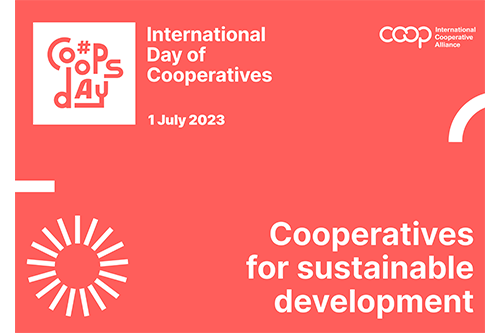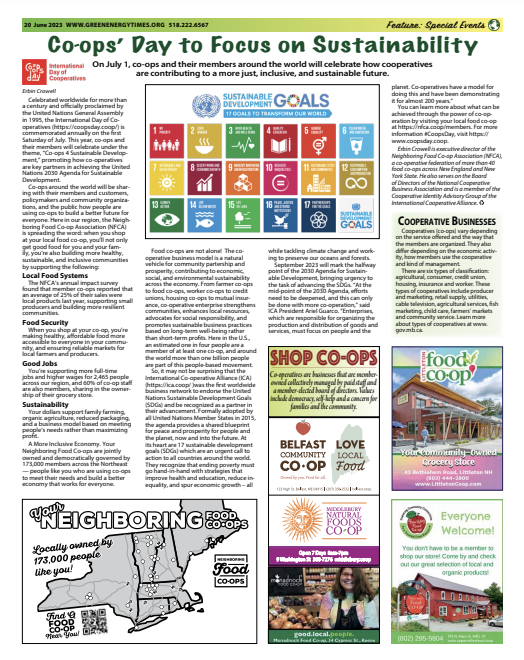
Green Energy Times, a publication that advances opportunities at the intersection of business, technology and sustainability in the U.S. Northeast, recently published a feature on next month’s International Day of Cooperatives written by Erbin Crowell, Executive Director of the Neighboring Food Co-op Association (NFCA), a cooperative federation of more than 40 food co-ops across New England and New York State. Crowell also serves on NCBA CLUSA’s Board of Directors and is a member of the Cooperative Identity Advisory Group of the International Cooperative Alliance. The feature raises awareness of how NFCA’s member co-ops—and the cooperative movement more broadly—are advancing the United Nations 2030 Agenda for Sustainable Development.
The feature that follows was first published in the Special Events section of the June-August 2023 edition of Green Energy Times.
Co-ops Day to Focus on Sustainability
On July 1, co-ops and their members around the world will celebrate how cooperatives are contributing to a more just, inclusive and sustainable future
Celebrated worldwide for more than a century and officially proclaimed by the United Nations General Assembly in 1995, the International Day of Cooperatives is commemorated annually on the first Saturday of July. This year, co-ops and their members will celebrate under the theme, “Co-ops for Sustainable Development,” promoting how co-operatives are key partners in achieving the United Nations 2030 Agenda for Sustainable Development.
Co-ops around the world will be sharing with their members and customers, policymakers and community organizations, and the public how people are using co-ops to build a better future for everyone. Here in our region, the Neighboring Food Co-op Association (NFCA) is spreading the word: when you shop at your local food co-op, you’ll not only get good food for you and your family, you’re also building more healthy, sustainable, and inclusive communities by supporting the following.

Local Food Systems
The NFCA’s annual impact survey found that member co-ops reported that an average of 25 percent of their sales were local products last year, supporting small producers and building more resilient communities.
Food Security
When you shop at your co-op, you’re making healthy, affordable food more accessible to everyone in your community, and ensuring reliable markets for local farmers and producers.
Good Jobs
You’re supporting more full-time jobs and higher wages for 2,465 people across our region, and 60 percent of co-op staff are also members, sharing in the ownership of their grocery store.
Sustainability
Your dollars support family farming, organic agriculture, reduced packaging, and a business model based on meeting people’s needs rather than maximizing profit.
A More Inclusive Economy
Your Neighboring Food Co-ops are jointly owned and democratically governed by 173,000 members across the Northeast—people like you who are using co-ops to meet their needs and build a better economy that works for everyone.
Food co-ops are not alone! The cooperative business model is a natural vehicle for community partnership and prosperity, contributing to economic, social, and environmental sustainability across the economy. From farmer co-ops to food co-ops, worker co-ops to credit unions, housing co-ops to mutual insurance, cooperative enterprise strengthens communities, enhances local resources, advocates for social responsibility, and promotes sustainable business practices based on long-term well-being rather than short-term profits. Here in the U.S., an estimated one in four people are a member of at least one co-op, and around the world more than 1 billion people are part of this people-based movement.
So, it may not be surprising that the International Cooperative Alliance (ICA) was the first worldwide business network to endorse the United Nations Sustainable Development Goals (SDGs) and be recognized as a partner in their advancement. Formally adopted by all United Nations Member States in 2015, the agenda provides a shared blueprint for peace and prosperity for people and the planet, now and into the future. At its heart are 17 sustainable development goals (SDGs), which are an urgent call to action to all countries around the world. They recognize that ending poverty must go hand-in-hand with strategies that improve health and education, reduce inequality, and spur economic growth—all while tackling climate change and working to preserve our oceans and forests.
September 2023 will mark the halfway point of the 2030 Agenda for Sustainable Development, bringing urgency to the task of advancing the SDGs. “At the mid-point of the 2030 Agenda, efforts need to be deepened, and this can only be done with more cooperation,” ICA President Ariel Guarco said. “Enterprises, which are responsible for organizing the production and distribution of goods and services, must focus on people and the planet. Cooperatives have a model for doing this and have been demonstrating it for almost 200 years.”
You can learn more about what can be achieved through the power of cooperation by visiting your local food co-op. For more information #CoopsDay, visit coopsday.coop.


